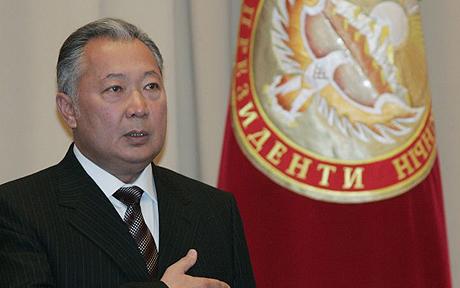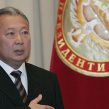
Bakiyev Promises Reform and Persecutes Opposition
Publication: Eurasia Daily Monitor Volume: 6 Issue: 165
By:

Following disappointing presidential elections in July, the Kyrgyz President Kurmanbek Bakiyev is continuing to sideline his political opponents and silence the local mass media. Opposition leaders are persecuted with the help of ingenious techniques. Their relatives are threatened with administrative and criminal charges, while opposition leaders themselves fear their physical removal. Despite the eroding democratic record in the country, the president is promising to change the lives of ordinary Kyrgyzstanis for the better.
On September 1 Bakiyev addressed the nation with a call for reform to improve national ideology, eliminate the legacies of the Soviet regime, and integrate the country into the international community (Kabar, September 1). The president described Western-imported ideas of democracy as often irrelevant in Kyrgyzstan’s setting. He promised to take into his own hands the process of constructing a national ideology. However, instead of listening to what local NGO’s [financed by the West] have to say, Bakiyev suggests following the principles of Res publica and building the country on the principles of "public matter."
While most of Bakiyev’s calls for change were fairly abstract, his idea of restructuring the state administration seemed more plausible. Bakiyev promised to reduce his powers, and provide more incentives for businesses. The president will form a special consultation body, which will invite leaders of ethnic minorities, representatives of the opposition, and public organizations to provide policy recommendations. A number of Kyrgyz experts rushed to claim that after five years of consolidating his power, the president finally has a chance to deal with political and economic reform. According to this view, Bakiyev dealt with the division of power and resources during his first term. This stage is now over, and it is time for structural change.
However, Bakiyev’s ambitions resemble similar efforts by former Russian president Vladimir Putin and Kazakhstan’s President Nursultan Nazarbayev. Using his political power and the country’s economic resources, Putin established a sense of stability at the expense of limiting democracy and freedom of speech. Similarly, Nazarbayev enjoys strong popularity at home thanks to the growing national economy and enhanced living standards. Both leaders sought to create a façade of democratic pluralism through populist and coercive political techniques. Yet, unlike Putin and Nazarbayev, Bakiyev lacks the natural resources to provide public goods. Instead, as the winter approaches, the population is anxious about the prospect of renewed power shortages and blackouts like last year.
Instead, Bakiyev will need to rely more on the support of law-enforcement structures and the military, as opposed to public support like his Russian and Kazakh counterparts. Today, Bakiyev has gathered enough power to singlehandedly implement substantial changes in the state structure -from altering his cabinet to holding early parliamentary elections. During his September 1 speech, Bakiyev promised not to dismiss the parliament for the ongoing constructive collaboration between his administration and MP’s.
Bakiyev shows little desire to collaborate with civil society groups or opposition representatives in the parliament. On the contrary, all major print and online news outlets experience pressure from the government and rarely publish critical reviews of Bakiyev’s policies. Several opposition leaders fled Kyrgyzstan prior to the elections. More journalists and NGO leaders fear being punished by the regime for their engagement in policy debates.
Meanwhile, opposition forces are facing stagnation. After Almazbek Atambayev, the leader of the opposition Social Democratic Party, lost the election to Bakiyev by a wide margin, the opposition’s ability to challenge the regime has been questioned. The opposition is likely to regroup in the coming months and choose different leaders to represent it. Unfortunately, for the opposition movement however, most of its leaders with widespread national popularity might lack enough funds to finance their campaigns.
Bakiyev’s continuous rule is therefore the most likely scenario for Kyrgyzstan today. His rule will weaken only if members of Ak Zhol will form internal coalitions and choose to follow other leaders within the party. The most likely government officials to lose their positions are Daniyar Usenov, the head of the president’s administration, and Adakhan Modumarov, the head of the Security Council. Both are influential political leaders potentially able to divide the Ak Zhol.
The success and sustainability of Bakiyev’s efforts to prolong his stay in power will only become clearer in the years ahead. As one Kyrgyz observer told Jamestown, "Some members of Ak Zhol are not comfortable with the regime’s politics. The growing authoritarianism and corruption is not what they signed up for two years ago."




